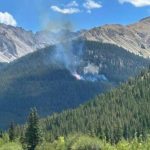Former supervisor of most-visited national forest shares concerns about ‘deliberate dismantling’ of public lands
The White River National Forest’s former supervisor says he retired after having to fire 16 employees

Chris Dillmann/Vail Daily
Months after retiring from his longtime role as the supervisor of the White River National Forest — the country’s most visited national forest — Scott Fitzwilliams says he is witnessing a “deliberate dismantling” of public lands.
In an interview earlier this month with The Landscape, a podcast produced by the Denver-based Center for Western Priorities, Fitzwilliams discussed why he felt forced to retire after 16 years as forest supervisor. He said the efforts of President Donald Trump’s administration to reduce staffing and funding for federal land management agencies, like the U.S. Forest Service, have led him to conclude public lands are under attack.
“It’s quite apparent to me that this is a deliberate dismantling of the public land institutions that this country has had for 130 years,” Fitzwilliams said in the Aug. 13 interview. “This is my elevator speech that I give everywhere: I think public lands are one of the great experiments in democracy. Nowhere else in the world does this. We have set aside land in the public trust, owned by everyone, and we’re messing with that.”
Having worked for the U.S. Forest Service for 34 years, Fitzwilliams said he had been thinking about retiring within the next couple years anyways. But what put him over the edge was having to tell what he described as hard-working employees that they were being fired because of poor performance.
In the first weeks of his presidency, Trump issued an executive order directing the heads of federal agencies to shrink the size of the federal workforce to eliminate “waste” and “bloat.” That was quickly followed by the Department of Government Efficiency firing thousands of probationary employees — who are typically employees in their first year of service — across the federal government, including an estimated 3,400 in the U.S. Forest Service.
“I had to fire 16 people and issue them a letter that said it was because of their performance,” Fitzwilliams said. “And I thought to myself, this is month one (of the Trump Administration) and they want me to lie like this. I can’t.”
Fitzwilliams described the firings as “dysfunctional.” Not only was there no plan in place for how the mass firings were to unfold but, at least in the White River National Forest, he said the idea that the firings would increase government efficiency did not make sense.
Of the 16 probationary employees fired, Fitzwilliams said 15 of the positions were funded either through “partner money” coming from outside the U.S. Forest Service or from fees the agency collects, such as fees for recreating at the Maroon Bells Scenic Area.
“There was no tax money, appropriated money that funded these people,” Fitzwilliams said. “So there was not a single dime saved by getting rid of them.”
A U.S. Forest Service spokesperson said in an email that the probationary employees who were fired were later reinstated, though a few chose to voluntarily resign. The spokesperson said the fired probationary positions were funded through “a mix of funding sources” but did not clarify further.
In March, Fitzwilliams accepted the Trump Administration’s deferred resignation option — which invited federal employees to voluntarily resign while continuing to receive pay and benefits for months — and retired from the U.S. Forest Service.
Fitzwilliams, who noted that the White River National Forest’s deputy supervisor also retired through the deferred resignation program this spring, said that the U.S. Forest Service has lost institutional knowledge through the Trump Administration’s downsizing. The agency was already short staffed before the Trump Administration began downsizing it by thousands of employees, he said.
“It’s such a horrible situation for the employees that are still working,” Fitzwilliams said. “The morale — as you might get — it’s beyond the basement. There’s no predictability. They don’t know what’s coming next.”
Fitzwilliams said that those who know his politics know “I’m pretty independent, in the middle of the road.” But he said he never thought that public lands and land management agencies would be under attack, because “there’s just so much passion behind them.”
Yet, in the past several months, Fitzwilliams said the Trump Administration has signaled its intent to further defund the U.S. Forest Service and other land management agencies, like the Bureau of Land Management. He also noted that Utah Sen. Mike Lee has proposed selling off public lands, although those proposals did not end up making it into the final version of the Big Beautiful Bill signed into law earlier this year.
But despite these efforts, Fitzwilliams said he believes there is a large coalition of Americans who love their public lands and will stand up to fight for them.
“This is a bump in the road,” Fitzwilliams said. “I really believe the recreating public and the people who love their public lands are going to stand up.”

Support Local Journalism

Support Local Journalism
As a Summit Daily News reader, you make our work possible.
Summit Daily is embarking on a multiyear project to digitize its archives going back to 1989 and make them available to the public in partnership with the Colorado Historic Newspapers Collection. The full project is expected to cost about $165,000. All donations made in 2023 will go directly toward this project.
Every contribution, no matter the size, will make a difference.










